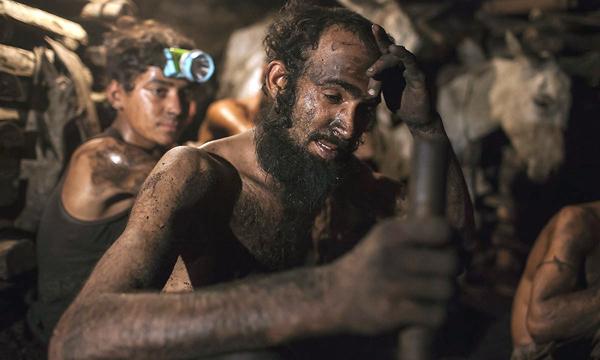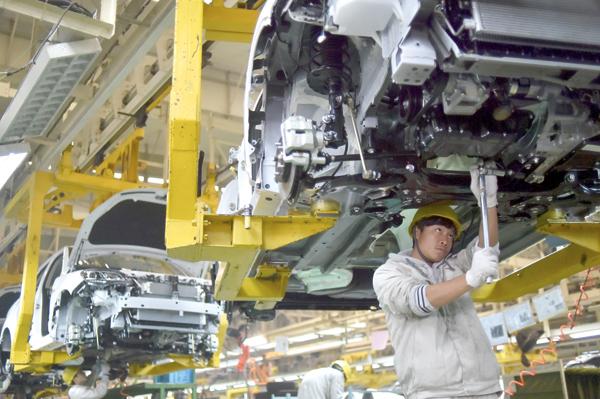You are here
China renews vow to avoid 'hard landing' as congress ends
By AFP - Mar 16,2016 - Last updated at Mar 16,2016
BEIJING — China's economy will not suffer a "hard landing", Premier Li Keqiang said on Wednesday, stepping up Beijing's charm offensive to reassure investors that the government can manage slowing growth.
"We have long-term confidence in the Chinese economy and this confidence isn't without a foundation," Li told his once-a-year press conference at the end of the National People's Congress (NPC), the communist-controlled legislature.
Beijing has been looking to send positive messages in recent weeks after expansion in the world's second-largest economy fell to a 25-year low of 6.9 per cent in 2015, raising concerns on global markets and sending commodity prices plunging.
Li has reduced the target for this year to a range of 6.5-7 per cent, while ratings agency Moody's has lowered its outlook on Chinese bonds.
Authorities have spent hundreds of billions of dollars to defend share prices and the yuan currency in recent months, raising questions over their commitment to market reforms.
Li acknowledged that the government had "controlled some things that should not be controlled, hindering productivity", and said leaders had failed to ensure a fair playing field in the economy.
But he added: "As long as we persist with reform and opening up, China's economy won't have a hard landing."
Questions have to be submitted in advance for the set-piece event. Li spoke for two hours in a cold room under glittering chandeliers in the Great Hall of the People.
"China's economy has both hopes and difficulties," Li said, adding: "If we look at it in light of the fundamentals and the overall trend, the hopes are greater than the difficulties."
Coal and steel
Li spoke after the rubber-stamp parliament approved an economic roadmap for the next five years and a charity law.
Votes at the NPC are normally overwhelming approvals of measures decided long in advance by the ruling Communist Party.
As the balloting started, a voice boomed over a loudspeaker asking delegates to press the voting buttons. Thousands of arms in suit jackets reached across the desks simultaneously.
There were 2,778 “Yes” votes for the 13th Five Year Plan, or 97.27 per cent of the total, the official Xinhua news agency reported, and 2,636 in favour of the charity law — 92.49 per cent.
The five-year plan for economic and social development pledged average growth of at least 6.5 per cent a year over the 2016-2020 period, implying that at times it could be lower.
Such plans are a legacy of China's command economy era but still guide policymakers at all levels.
Cracks in the economy are already showing as growth slows. Thousands of miners went on strike in northeastern China to protest at unpaid wages, amid fears of mass layoffs as the government seeks to restructure lumbering state-owned industries.
Premier Li worked to dispel fears on the issue.
"We have chosen the two sectors of coal and steel to make breakthroughs, and at the same time avoid a massive wave of lay-offs," he said.
The finance minister last week said China's labour regulations harm workers by reducing job opportunities.
The labour contract law passed in 2007 restricts companies' ability to fire workers. Minister Lou Jiwei said it was discriminatory towards people entering the workforce, and so ultimately counterproductive.
His comments on the sidelines of the National People's Congress (NPC) echo debates around the world on the conflict between job creation and protection of existing employees.
Communist China was once a command economy where many workers could rely on their work unit, or "danwei", for everything from housing to medical care.
Three decades ago it embraced market principles, dubbed "socialism with Chinese characteristics", triggering a huge economic boom. But some sectors remain bloated and inefficient, particularly state-owned enterprises.
Lou said the labour law's "original purpose was to protect workers, but in the end it harms the interests of some workers, and may lead to a rapid rise in wages", increasing firms' costs and leading them to move operations overseas.
"Ultimately who is harmed? It's workers who are harmed," he added. "The job opportunities are reduced."
He did not propose specific reforms but said the finance ministry "must point out problems it sees, because it has an effect on the entire economy".
Reducing overcapacity in industrial sectors such as steel and coal has become an urgent priority for the world's second-largest economy as it seeks to transition away from investment-led economic growth towards a consumer-driven model.
But such cuts have raised worries of vast lay-offs akin to the wave of 30 million job losses experienced in the 1990s when Beijing shuttered thousands of state-run companies, and the ruling party is always keen to prevent social unrest.
At the opening of the NPC, Premier Li pledged to kill "zombie enterprises" and cut excess capacity through mergers or liquidations.
Earlier this month, the country's top economic planner reiterated a goal of reducing steel capacity, an industry suffering a global glut, by 100-150 million tonnes within five years, but added that such cuts would "definitely not" cause mass unemployment.
In February, the minister of human resources and social security estimated there would be 1.8 million lay-offs due to restructuring in the coal and steel industries, without giving a timescale.
To cushion such blows, Li said the central government would allocate 100 billion yuan ($15 billion) over the next two years for a labour resettlement fund.
Tough reforms decreed by central authorities have often suffered from a lack of implementation in China.
Lou said that pushing through change would require determination from top authorities and a willingness to "gnaw the hard bone", an expression roughly meaning to "bite the bullet".
According to the plan, the gross domestic product (GDP) is set to rise from 67.7 trillion yuan ($10.4 trillion) last year to more than 92.7 trillion yuan in 2020.
'Good Samaritans'
It also seeks to significantly reduce poverty by 2020. Officials have declared charitable organisations essential to achieving the goal and hope to encourage more giving with the charity law.
As the economy has grown to the world's second-largest, charitable giving has lagged, with China ranking 144th out of 145 countries for giving, according to a study last year by the Charities Aid Foundation.
Chinese citizens donated just $16 billion in 2014, according to the most recent data from the China Charity Information Centre, less than 0.2 per cent of annual GDP.
Xinhua said the new law was intended to "recruit help from good Samaritans in realising the 2020 poverty alleviation target".
Separately, China's labour protections are coming under fire from high places as economic restructuring pits officials concerned about social stability against a lobby arguing inflexible policies are stifling job creation and suppressing wages.
Company executives, especially at foreign or private firms, have long been critical of labour contract legislation and minimum wage laws that make it difficult for owners of an ailing business to turn it around or find willing buyers.
Now policymakers anxious to modernise China's slowing economy and slash overcapacity in heavy industry are making similar noises.
The export powerhouse province of Guangdong, a trillion-dollar economy that often leads the way on market reforms, said this month it would scrap scheduled rises to the local minimum wage in 2016, and keep it at 2015 levels, slightly over 1,500 yuan ($230) per month, through 2018.
The law fixed a 40-hour working week for most employees, regulated maternity leave, and required businesses to be able to prove their case for sacking employees for incompetence or criminality or face heavy penalties.
Its standards aspire to those of developed economies, rather than emerging markets, though enforcement is weak.
The European Union, for example, limits the working week to 48 hours, while China's maximum is about the same, after allowing up to 36 hours a month overtime.
Regulations say minimum wages should be between 40 and 60 per cent of the local average, though in practice 30-40 per cent is typical, compared with about 30 per cent in the United States and 50 per cent in Britain.
Protections against dismissal are comparable to Japan's.
"The Chinese government wanted the best, the most polished labour legislation they could find, and simply imposed it on an economy that couldn't cope with it," said Geoffrey Crothall, communications director at China Labour Bulletin.
Chinese wages have risen at double-digit rates since the 2008 act, so factory workers now earn significantly higher than competitors in Bangladesh, Vietnam and Cambodia, and some think labour protections are hampering an economic transformation that will benefit workers in the long run.
"For enterprises and employees, the extent of protection afforded by the Labour Contract Law is unbalanced," Lou said, adding it encouraged companies to moves jobs from China to other countries.
Labour activists say the protections are still needed, and businesses often break labour law with impunity, especially if they have local government connections.
Danny Lau, who owns a factory in Dongguan city in Guangdong, said he expected the government would soon "consolidate and streamline" the contract law to lower costs for manufacturers.
That would be welcome news to businesses exasperated by official interference in their operations.
"We have these government bureaucrats who show up at our facility arbitrarily, and they say, 'let's look at your payroll'," said Ravin Gandhi, chief executive officer of GMM Nonstick Coatings, which runs an office in Dongguan.
"And they say, 'Thirty per cent of your facility workforce is going to get a pay raise. These people here are going to get 15 per cent.' They don't look at your profitability, nothing."
As a result, GMM opened its next facility in India, which Gandhi said was 40 per cent cheaper than China, even allowing for inferior infrastructure.
"Of course, I'm going to take my foot off the gas pedal [in China]," he added. "I'll put those dollars in India."
When Reuters visited a printing factory in Chongqing in January, the boss was interrupted mid-interview by local officials, who had come to make sure he had paid salaries before the Lunar New Year holidays.
"[Last year] they called us into a meeting and said, 'You can't lay off employees'," he added.
Many economists say China has posted lacklustre business activity and investment figures, while official unemployment stays below 5 per cent, precisely because companies saddled with high wage bills and low profit margins can't cut debt or invest.
"It's better to support workers than supporting loss-making firms," Li Yining, an economist at Peking University, said on the sidelines of the annual parliament meeting.
Local officials have reason to be cautious about diluting protections, however, as a rise in worker protests in their patch can be both physically dangerous and career limiting.
Cui Ernan, labour analyst at Gavekal Dragonomics, said the government might even increase labour benefits to calm agitated workforces, particularly in regions with heavy lay-offs from coal and steel.
"Recent labour strikes at the end of 2015 and the beginning of 2016 are at historical highs," she noted.
Related Articles
SYDNEY — Global miners are battling to stay afloat after enduring one of the toughest years in recent times, with tumbling commodity prices
BEIJING — China's economic slowdown is hitting profits at more foreign companies, a survey by an American business lobby showed, while the v
BEIJING — Huge industrial overcapacity in China will drag on both the country's and the region's growth this year, the Asian Development Ban



















